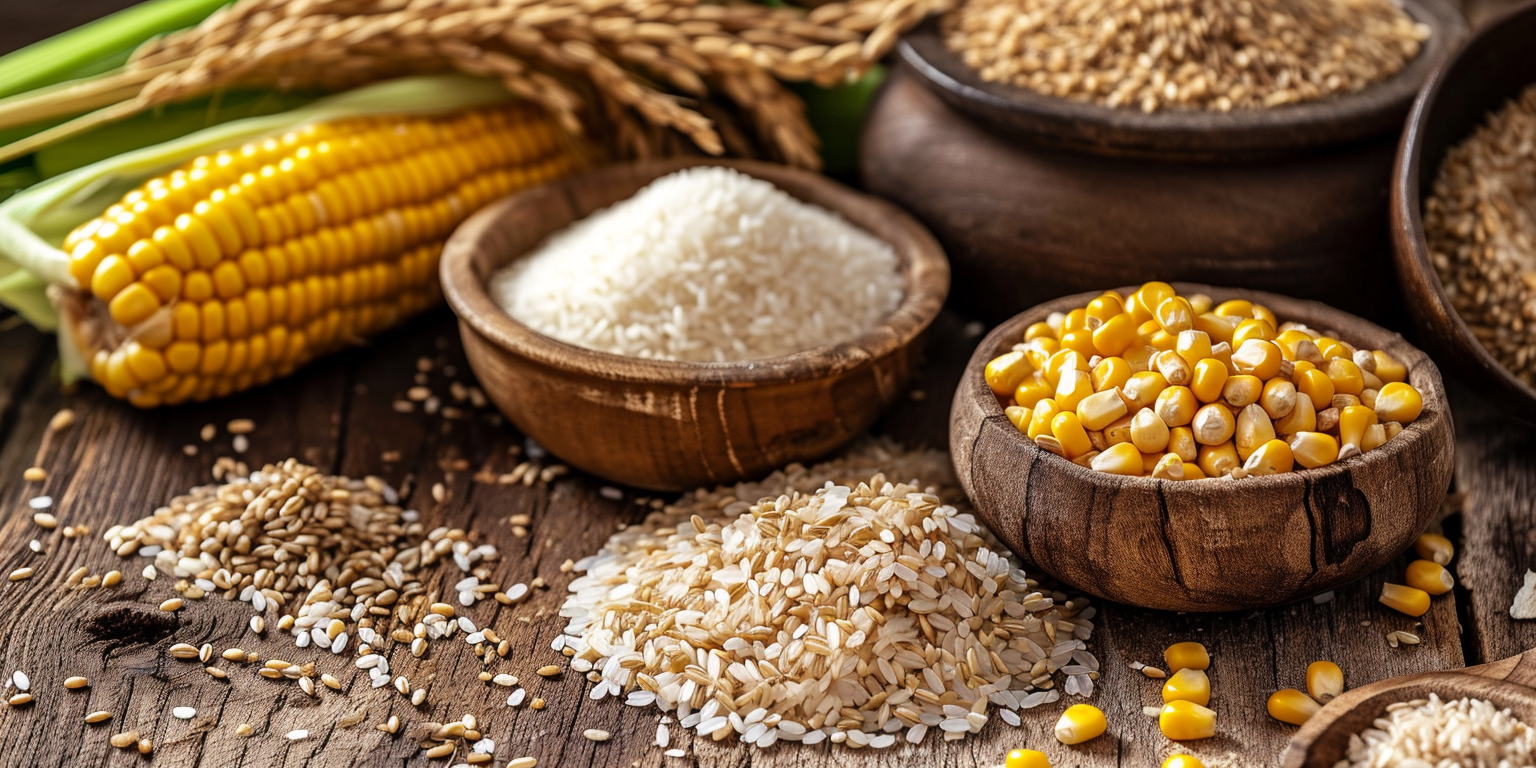Why Going Gluten-Free Might Actually Be Bad for Your Health

Why Going Gluten-Free Might Actually Be Bad for Your Health
Cutting out gluten from your diet without guidance can lead to nutrient deficiencies like fiber, B vitamins, and iron, affecting your health. Whole grains are important for digestive health, energy, and immune function. Imbalance in a gluten-free diet may disrupt essential nutrient intake and increase sugar and fat consumption. Gluten-free substitutes often lack the health benefits of whole grains. Without medical advice, nutrient deficiencies and harm can occur. Seek professional guidance for a balanced gluten-free diet. Understanding the potential downsides of going gluten-free is essential for your overall well-being. Additional insights await on the impact of this dietary choice.
Key Takeaways
Gluten-free diets may lack essential nutrients like fiber, iron, and B vitamins found in whole grains.
Higher sugar and fat content in gluten-free foods can lead to weight gain, heart disease, and diabetes.
Imbalance in dietary intake without whole grains can disrupt essential nutrient balance.
Possible harm without medical diagnosis can result in nutrient deficiencies and health complications.
Lack of nutritional benefits from whole grains in gluten-free diets may impact overall well-being.

Potential Nutrient Deficiencies
When starting on a gluten-free diet without medical necessity, you may unknowingly put yourself at risk for potential nutrient deficiencies that could impact your overall health. Gluten, a protein found in wheat, barley, and rye, is commonly eliminated in gluten-free diets. However, gluten-containing foods like whole grains are essential sources of nutrients such as fiber, B vitamins, and iron. By restricting whole grains on a gluten-free diet, you may be missing out on these important nutrients necessary for various bodily functions.
Fiber plays an important role in digestive health, B vitamins are necessary for energy production, and iron is crucial for oxygen transport in the body. Without careful planning, a gluten-free diet may lack these key vitamins and minerals, leading to potential nutrient deficiencies. These deficiencies can not only impact your digestive health but also your energy levels and immune function. Hence, it is essential to consider supplementing or diversifying your diet to prevent nutrient deficiencies when following a gluten-free diet without medical guidance.
Incorporating alternative sources of fiber, such as fruits, vegetables, and gluten-free whole grains like quinoa or brown rice, can help mitigate the risk of nutrient deficiencies. Additionally, consulting with a healthcare provider or a registered dietitian can provide personalized guidance on maintaining a balanced and nutrient-rich gluten-free diet to support your overall health and well-being.
Imbalance in Dietary Intake
Shifting to a gluten-free diet without medical necessity can disrupt the balance of essential nutrients in your intake, potentially leading to deficiencies in key vitamins and minerals. Whole grains, a common source of fiber, B vitamins, and iron, are often eliminated in gluten-free diets. These nutrients play vital roles in maintaining overall health, including digestive health and heart health. By removing whole grains, you may compromise your nutrient intake, which could impact your well-being.
Moreover, gluten-free substitutes sometimes contain higher levels of unhealthy ingredients like sugar, fat, and salt to enhance taste and texture. This can lead to a decrease in diet quality and an imbalance in nutrient intake. The lack of fiber from whole grains in a gluten-free diet can contribute to digestive issues such as constipation, emphasizing the importance of maintaining a diverse and balanced diet.
Research suggests that a gluten-free diet may not provide the same benefits as a diet containing gluten when it comes to overall health. It is essential to be mindful of nutrient balance when making dietary changes, ensuring you are still getting essential vitamins and minerals necessary for excellent health.

Higher Sugar and Fat Content
Gluten-free foods often contain elevated levels of sugar and fat compared to their gluten-containing counterparts. This can be attributed to the use of added sugars and fats in many gluten-free products to compensate for the taste and texture that gluten would normally provide. While going gluten-free may offer potential health benefits for individuals with specific medical conditions like celiac disease or gluten sensitivity, the higher sugar and fat content in these products can pose health risks for those without such conditions.
Consuming excess sugar and fat is associated with weight gain and a variety of health issues, including an increased risk of heart disease and diabetes. As such, the elevated levels of sugar and fat found in gluten-free foods could potentially offset any advantages of following a gluten-free diet. It is important to be mindful of your sugar and fat intake when opting for gluten-free alternatives to maintain overall health.
Being aware of the ingredients in gluten-free products and making informed choices can help you manage your sugar and fat consumption. Checking labels for added sugars and fats, opting for whole foods whenever possible, and balancing your diet with nutrient-dense options can assist you in addressing the potential pitfalls of higher sugar and fat content in gluten-free foods. Striking a balance and being mindful of your sugar intake can contribute to a healthier gluten-free lifestyle.
Lack of Nutritional Benefits
Switching to a gluten-free diet without medical necessity can potentially result in a lack of essential nutrients necessary for overall health, such as fiber, iron, and B vitamins typically found in whole grains. Whole grains play an important role in providing significant health benefits like improved heart health, better digestion, and a reduced risk of diseases such as Type 2 diabetes and certain cancers. By eliminating whole grains and opting for gluten-free substitutes, individuals may miss out on these benefits, leading to nutrient deficiencies and impacting overall diet quality.
Gluten-free substitutes often contain higher levels of fat, sugar, and salt to compensate for the lost texture and flavor from removing gluten. This adjustment in the composition of gluten-free products can contribute to weight gain and potential health issues. Studies have shown a correlation between gluten-free diets and weight gain, emphasizing the negative effects of missing out on the essential nutrients found in whole grains.
In essence, the lack of nutritional benefits in gluten-free diets can have adverse effects on your health. It is essential to take into account the potential nutrient deficiencies that may arise from eliminating whole grains and to make sure that your diet remains balanced and rich in essential nutrients to support overall well-being.
Possible Harm Without Medical Diagnosis
Without a proper medical diagnosis, starting a gluten-free diet may pose risks of nutrient deficiencies and potential health complications. Gluten-containing foods, such as whole grains, are rich in essential nutrients like fiber, B vitamins, and iron that contribute to overall well-being. When individuals adopt a gluten-free diet without medical guidance, they may inadvertently miss out on these essential nutrients, leading to imbalanced nutrition and potential negative impacts on their health.
It’s important to understand that gluten-free products are not always fortified with the same level of essential nutrients as their gluten-containing counterparts. Without a medical reason to eliminate gluten, individuals may be depriving themselves of the health benefits provided by whole grains, increasing the likelihood of deficiencies in key nutrients necessary for best functioning.
Making dietary choices without a medical diagnosis can have unintended consequences, potentially harming your health in the long run. Seeking professional advice before starting on a gluten-free diet is essential to prevent nutrient deficiencies and make sure that your nutritional needs are adequately met. Prioritizing informed decisions and consulting healthcare providers can help you navigate dietary changes safely and sustainably for your overall well-being.
Frequently Asked Questions
Is There a Downside to Going Gluten-Free if You Re Healthy?
If you’re healthy, going gluten-free unnecessarily may lead to nutrient deficiencies. Whole grains offer essential nutrients like fiber and vitamins. Gluten-free alternatives can be higher in sugar and fat, potentially impacting your health negatively.
Why Are Doctors Against a Gluten-Free Diet?
Doctors caution against a gluten-free diet because it can lead to nutrient deficiencies without medical necessity. Whole grains provide essential nutrients like fiber, vitamins, and minerals important for overall health, which may be lacking in gluten-free alternatives.
What Is the Benefit of Not Eating Gluten?
Avoiding gluten without medical necessity can lead to missing out on important nutrients found in whole grains, like fiber, vitamins, and minerals. Consider consulting a healthcare provider before making drastic dietary changes for best health outcomes.
Why Do I Feel Worse on a Gluten-Free Diet?
Feeling worse on a gluten-free diet? Your body might miss out on essential nutrients found in whole grains. Make sure your choices provide the vitamins and minerals you need for balanced health.
Conclusion
To wrap up, prior to hopping on the gluten-free bandwagon, consider the potential risks involved. Without a medical reason, eliminating gluten from your diet could lead to nutrient deficiencies, imbalanced dietary intake, and increased sugar and fat consumption. Remember, not all that glitters is gold - don’t be fooled by the gluten-free trend without considering the potential harm it may cause. It’s vital to make informed decisions about your diet to guarantee you’re getting the nourishment your body needs to thrive.




